by Rosie Malek-Yonan and Soner Önder
23 November 2010
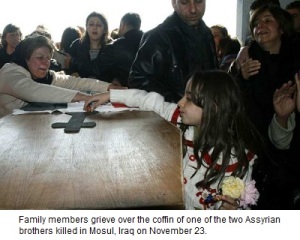 (AINA) — When on 31 October 2010, the Church of Our Lady of Salvation in Baghdad was purportedly seized by terrorists, Al-Qaida’s Iraqi affiliate, the Islamic State of Iraq (ISI), claimed responsibility and defined churches as: “The dirty place belonging to the infidels that Iraqi Christians have long used as a base to fight Islam.”
(AINA) — When on 31 October 2010, the Church of Our Lady of Salvation in Baghdad was purportedly seized by terrorists, Al-Qaida’s Iraqi affiliate, the Islamic State of Iraq (ISI), claimed responsibility and defined churches as: “The dirty place belonging to the infidels that Iraqi Christians have long used as a base to fight Islam.”
The well-organized attack on civilian parishioners and priests resulted in a terrifying hostage takeover. As the drama unfolded, it became one of the bloodiest massacres against the Assyrians since the beginning of the 2003 Iraq War. Three priests and 68 non-combative parishioners were murdered and dozens of terrorized men, women and children wounded, leaving a nation forever emotionally bewildered and scarred. Amnesty International called the barbaric attack a “war crime” while worldwide, Assyrians view this massacre as yet another attempt to uproot their existence from the Middle East.
In a press release, ISI stated: “All Christian centers, organizations and institutions, leaders and followers, are legitimate targets for the mujahedeen (holy warriors) wherever they can be found.”
However, the selection of Christian Assyrians as “legitimate targets” by fundamentalists is not a new phenomenon. One can find similar events throughout the course of history.
But why do they want to target the Christian Assyrians?
The simple answer is that these fundamentalists want to rid Iraq of its Christian population. Historically, one can find deeply rooted discourses towards Christians in the Middle East, which also constitute the background for the present-day discrimination, oppression and massacres.
Hostages and Infidels
It is common knowledge that Christians in the Middle East are viewed as “infidels” and “collaborators” with Western countries and as such have become targets whenever there is a crisis in the region involving Western countries, particularly if the west is the aggressor. Fundamentalists such as Al-Qaida often act out their aggression against Western politics by attacking Christians in their own backyard. The rapidly shrinking number of Christians in the region attests to that.
What is remarkable in the case of the Assyrians of Iraq is that they are not only in the midst of an ethnic cleansing but also a religious cleansing since they are essentially the people of the cross and as such, not only have they become hostages in their own churches, but are also hostages in their own homeland. The tolerant behavior of the Assyrians particularly their acceptance of others in the region is viewed by the oppressors as being submissive and since the Assyrians do not strike back in retaliation, they continue to remain easy prey.
Even though Assyrians are the indigenous people of today’s Iraq, having been there long before the creation of Iraq and the birth of Christianity, they are treated as outsiders and are being forced to leave their homeland. This peaceful nation has been turned into a “hostage nation” with no one negotiating a release. They are hostages since so many have virtually nowhere to go and no means to help the situation they are trapped in.
The mass migration into neighboring countries in the past several years has produced catastrophic results. Poverty, kidnappings for ransom, and the lack of provisions for even a meager existence is what this “hostage nation” is forced to contend with since the international community has until now to a large extent ignored this massive problem. Their thunderous silence is a contributing factor to the ongoing violation of the human rights of the Assyrian nation and all Christians who call the Middle East home.
In the eyes of the Assyrians, this indifference to their suffering is nothing new. The 20th Century was wroth with events that shaped the future of this small nation as it clung to survival through periods of genocide, massacres, discrimination, death marches, and forced mass migration to distant shores. To say they are disappointed in the international community for not having shown interest in their crisis is indeed an understatement.
Sometimes it is difficult to find the right words when confronted with unbearable reality. The bloody Church Massacre in Baghdad is indeed one of those times. It leaves one speechless. To convey mere words of condolences is simply not enough for the survivors and a nation in mourning. This is more than just a tragedy when one hears the testimonies of the surviving eyewitnesses and studies the published and unpublished photos and videos of the bloodshed. Bodies ripped to pieces, chunks of flesh stuck to wood and plaster and a desecrated house of worship turned into a house of death.
How does one begin the healing process? How does one mend the minds and hearts of the survivors who will forever recount the long ordeal and the aftermath of such a tragic event? The bombed church will be rebuilt. Bullet holes will be repaired. Shattered glass will be replaced and a new coat of paint will cover the bloodstained walls and ceiling. But what does one do with the memories that will linger on at Our Lady of Salvation? How can one push the ghosts away that will remain there for all eternity?
These collective images reconstruct the post-modern version of El Guernica. For the minorities of Iraq, the war against human rights and humanity has reached its boiling point. All polite social behavior is meaningless when despicable acts are unleashed on the meek. Offers of condolences are hollow words to the Assyrians who are facing extinction.
What this nation needs is a concrete plan of action to be formulated and enforced immediately for their protection.
Admittedly, the Church Massacre in Baghdad did generate a modicum of sentiment from the international community, more so than in the past. But the overall reaction has been weak. The obligation for a serious global address of the ethnic and religious cleansing of the Assyrians including all its various Christian denominations in Iraq is met by avoidance of the issue altogether. Most Western leaders and in particular the U.S. are defining this critical moment in history by their words or lack there of. It is not only this ancient civilization that is on the verge of extinction. It is rather the beginning of the demise of all civilizations when humanity crumbles and no one attempts to stop the domino effect that will soon become a global epidemic.
Is it just wishful thinking on the part of the Assyrians and many other ethno-religious minorities to continue to wait for the Iraqi Government and the international community to bring about peace and safety to the region?
Samuel Beckett’s 1948 absurdist play, Waiting for Godot, serves as a grotesque metaphor for the Assyrians. They are much like the two main characters of the play who wait for Godot while occupying themselves over a course of two days with everything from the mundane to even contemplating suicide. And Godot never arrives.
Assyrians have been waiting for Godot for many years. They waited for Godot during and after the Assyrian Genocide (1914-1918) when two-thirds of that nation perished in Ottoman Turkey and Northwestern Iran. They waited for Godot during the 1933 Simmele Massacre. They waited for Godot during the first and second Gulf Wars. Today Assyrians are still desperately waiting for Godot.
ESTRAGON: What do we do now?
VLADIMIR: Wait for Godot.
ESTRAGON: Ah!
Silence.
VLADIMIR: …What are we doing here, that is the question. And we are blessed in this, that we happen to know the answer. Yes, in this immense confusion one thing alone is clear. We are waiting for Godot to come—
ESTRAGON: Ah!
Post Saddam: Unfolding the Assyrian Destiny in Iraq
Before the US-led invasion of Iraq, there were around 1.4 million Assyrians living in the Iraq. Today less than 400,000 remain. Following Saddam’s fall and during the reconstruction of Iraq, many NGOs reported that minorities have become even more isolated and discriminated against in all aspects of social and political life, inevitably turning into soft targets for Al-Qaida and related sub-contractor organizations.
To date, the Iraqi Government has proven to be incapable and grossly unmotivated to protect the ethnic and religious minorities who are citizens of its own country. This indifference is resulting in massacres and mass exodus particularly in the case of the Assyrian Christians. Assyrians are facing two choices: either continue to wait for Godot or flee from Iraq. The latter is a difficult decision in light of the fact that many do not want to leave what they recognize to be their ancestral homeland dating back thousands of years. Despite this, multitudes have been forced to leave for Western countries.
According to UNHCR statistics, although Assyrian Christians constituted 3% of the Iraqi population before the war, 15% of the registered refugees are in fact Assyrians of all Christian denominations. According to church sources, 40% of Iraq’s post-war refugees are Christians.
Those who fled to neighboring countries continue to live in deplorable conditions. There are numerous published reports on the alarming circumstances of these refugees in Syria and Jordan.
Refugees who are able to reach Western countries, more often than none, will face an unfriendly reception. This attitude partly stems from the financial burden host countries are forced to bear, resulting in the development of inhumane and unethical policies in dealing with Iraqi refugees. Closing their borders and sending these helpless refugees back into the middle of conflict and doing almost nothing for their protection in Iraq, is unjustified and does not fit with democratic moral values.
The Approach of the International Community
Western countries have moral and political obligations to act effectively not only by voicing their concern, but by actively protecting the human rights of at risk nations. Why are they then casting themselves in the role of Godot?
On 26 October 2009, the US Senate adopted Resolution 322 whereby expressing the need to call for a more effective policy. However, the crux of the problem has not been addressed and nor has a specific measure been developed regarding the protection of the ethnic and religious minorities in Iraq.
A statement issued by the White House Press Secretary, Robert Gibbs, in the aftermath of the Assyrian Church Massacre in Baghdad, is indicative of the superficial approach to this massive problem in Iraq: “The United States strongly condemns this senseless act of hostage taking and violence by terrorists linked to al-Qaeda in Iraq…”
The U.S. Commission on International Religious Freedom (USCIRF) has stated that it is time for the Obama administration to “ensure that U.S.-Iraq policy prioritizes the plight of the country’s vulnerable religious minority communities (…)”.
On the issue of “political agenda”, political scientist, John W. Kingdon (1984), theorizes that the first necessary step is the recognition of a question as a “political problem.” Applying this to the situation of the Assyrians, their problems in Iraq are not recognized as a specific “political problem” to warrant the issuance of a strategic policy. Thus, many countries are not becoming vested in this issue and do not see this as worthy enough problem.
One of the obvious pitfalls of isolating the Christian question is that since they are in fact Iraqi citizens, they are being treated equally and not looked at as a separate ethnic group that is internally under attack by other Iraqi citizens. Inserting this kind of diplomacy is just a polite way of overlooking the question altogether. This argument is definitely blind and unethical with regards to the specific problems of minority groups.
The March Towards the End of Time for the Assyrians and Other Minorities in Iraq
The end of time is close at hand for the Assyrians in Iraq. On the heels of the Church Massacre there were additional attacks on individuals and on Christian Assyrian homes resulting in more murders and devastation. One does not need to be an analyst to predict the future. It is rapidly writing itself.
Assyrians have lost their patience after seven years of endless attacks, constant threats and the nonchalant shrug of the international community. Peace is nowhere in their future and their homeland.
The UK based, Archbishop Athanasios Dawood, has openly advised all Christians to leave Iraq. A week after the massacre, in an interview with an Assyrian, the respondent said, “In my neighborhood they all hate me…When you see people on the streets, they ask, ‘Why are you still here? You should leave…'”
Although it may seem wrong to advise people to leave their homeland or country of origin, however, one must consider the safety and welfare of the innocent who are caught in the crossfire of a situation not of their own making or choosing.
If this acute condition persists and no serious efforts are taken for the protection of these people, they will rapidly flee. In that case, is any Western country ready and willing to receive thousands of refugees? Is any government ready and willing to orchestrate a safe mass exodus without merely distributing them around the globe but relocating them near already established Assyrian communities in order that the integration into a new life will not be a complete culture shock? They will need the support of their own communities in the diaspora.
It must be noted that German and French officials have offered asylum to Iraq’s Christians, however, according to the Washington Post (23 November 2010), Yonadam Kanna, the Christian Representative in Iraq, has rejected asylum offers from the west, criticizing them as “meddling in Iraq’s problems.”
No Democratic Future for Iraq Without Minorities
The U.S. must develop a clear and concrete policy to address the core problem it had a hand in creating. The United Nations Secretary General must play a key role by taking immediate initiative to follow through with a solid plan to insure the security and well-being of these minorities. Similarly, the European Union, particularly the High Representative of the EU for Foreign Affairs and Security Policy must become involved in the process in order to develop a European approach to the question at hand. Considering the fact that many refugees are seeking protection in EU Member States, this question should be of high priority to the EU. International humanitarian organizations, the Iraqi Government and even other Middle Eastern countries must all step up to the plate.
In order to discuss the different dimensions of the problem and focus on finding common solutions, an international conference focusing on the situation of Iraqi minorities can be a significant starting point. With the UN or Iraqi government’s initiative, such an international conference may be able to bring all concerned policy makers, including states and NGOs under one roof leading to the development of a new policy for the protection of all minorities in Iraq and eventually all minorities in the Middle East.
Finally, it is essential to consider as a viable solution, the realization of a self-administrative area in the Nineveh Plains in Northern Iraq where Assyrians and other ethnic and religious minorities constitute the majority of the population. Aside from its potentially democratic function, a self-administrative area can become a “shelter” for Christian Assyrians and other minorities in Iraq. If the true aim of Iraq is to realize a democratic society and not an Islamic state, it must tolerate and safeguard all its citizens regardless of differences in religion, language, ethnicity, race and gender. As a matter of policy, Iraq should immediately provide effective security measures in Baghdad, Mosul and particularly in other areas where minority groups are targets of Al-Qaida and other terrorists groups. With the disappearance of its indigenous people, there will be no democratic future for Iraq. Without democracy in the region, the demise of the human race is at hand.
©2010 Rosie Malek-Yonan and Soner Önder. All Rights Reserved.
Rosie Malek-Yonan, Author, The Crimson Field
Soner Önder, Political Scientist, Stockholm University
Published: Assyrian International News Agency

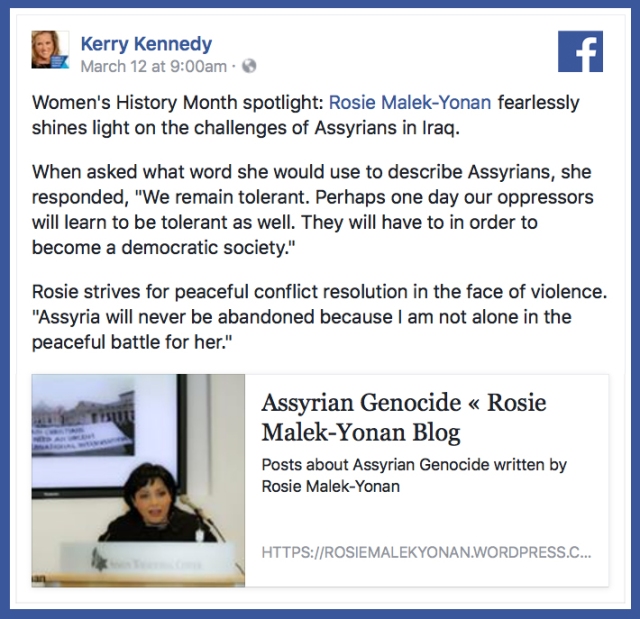

 Attiya Gamri (Haarlem, Netherlands)
Attiya Gamri (Haarlem, Netherlands)
 Jonta, “Yimma d’Nahla” (Nahla, Iraq)
Jonta, “Yimma d’Nahla” (Nahla, Iraq) Helen Malko (New York City, New York)
Helen Malko (New York City, New York) Nineveh Dinha (Salt Lake City, Utah)
Nineveh Dinha (Salt Lake City, Utah) Muna Yaku (Erbil, Iraq)
Muna Yaku (Erbil, Iraq)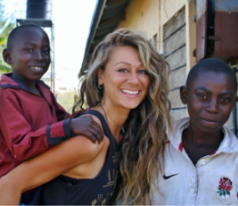 Sumer Homeh (Nairobi, Kenya)
Sumer Homeh (Nairobi, Kenya)
 Atorina Zomaya (Chicago, Illinois)
Atorina Zomaya (Chicago, Illinois) Maryam Shamalta (San Jose, California)
Maryam Shamalta (San Jose, California)  Kara Hermez (Stockholm, Sweden)
Kara Hermez (Stockholm, Sweden)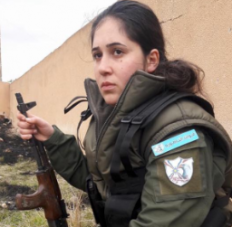 Samar George (Khabour, Syria)
Samar George (Khabour, Syria)


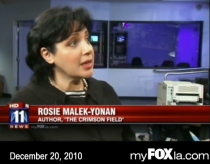

 (
(

 With the onset of the 2004 US-led invasion of Iraq, the ancient Assyrian Christian community was at once under attack. An early sign of violence against the Assyrians was the bombing of the Holy Spirit Church in Mosul on 26 June 2004. To date, 65 churches have been attacked or bombed; 40 in Baghdad, 19 in Mosul, 5 in Kirkuk and 1 in Ramad
With the onset of the 2004 US-led invasion of Iraq, the ancient Assyrian Christian community was at once under attack. An early sign of violence against the Assyrians was the bombing of the Holy Spirit Church in Mosul on 26 June 2004. To date, 65 churches have been attacked or bombed; 40 in Baghdad, 19 in Mosul, 5 in Kirkuk and 1 in Ramad On Sunday 28 February 2010, hundreds of Assyrians in Baghdad came out in a peaceful demonstration against the murder of ten Christians in Mosul. The murders sent Assyrians in a mass exodus from Mosul. On 4 March 2010, the United Nations humanitarian arm reported that 4,320 Iraqi Christians were displaced following the recent unrest in the northern city of Mosul.
On Sunday 28 February 2010, hundreds of Assyrians in Baghdad came out in a peaceful demonstration against the murder of ten Christians in Mosul. The murders sent Assyrians in a mass exodus from Mosul. On 4 March 2010, the United Nations humanitarian arm reported that 4,320 Iraqi Christians were displaced following the recent unrest in the northern city of Mosul. The recent events in Mosul, should give the Assyrian communities outside of Iraq enough of an impetus to go out and cast votes without fear of persecution or loss of life. For those of us who live comfortable lives in the west, the importance of voting in the 2010 Iraqi elections are even greater than ever. We are at a turning point. In the upcoming Iraqi elections that will take place on March 5, 6, and 7, we are limited to
The recent events in Mosul, should give the Assyrian communities outside of Iraq enough of an impetus to go out and cast votes without fear of persecution or loss of life. For those of us who live comfortable lives in the west, the importance of voting in the 2010 Iraqi elections are even greater than ever. We are at a turning point. In the upcoming Iraqi elections that will take place on March 5, 6, and 7, we are limited to  Please get out to the polls and vote! Your vote will send a loud message to our brothers and sisters in Iraq that they are not forgotten and that we stand with them. If you are among the handful who are calling for the boycotting of the elections, I am asking you to take a hard look at the bigger picture. No one will care if we boycott. But they will gladly take what is rightfully ours because we will be giving it to them. Step in the shoes of members of our own nation who can’t make the trip from their homes to a voting place to simply cast a vote because they are being threatened. I am also asking you to please consider those who will bravely make the deadly trip to the polls.
Please get out to the polls and vote! Your vote will send a loud message to our brothers and sisters in Iraq that they are not forgotten and that we stand with them. If you are among the handful who are calling for the boycotting of the elections, I am asking you to take a hard look at the bigger picture. No one will care if we boycott. But they will gladly take what is rightfully ours because we will be giving it to them. Step in the shoes of members of our own nation who can’t make the trip from their homes to a voting place to simply cast a vote because they are being threatened. I am also asking you to please consider those who will bravely make the deadly trip to the polls. Professor Ellene Phufas, who teaches World Literature for the SUNY system, contacted me to include my book, “
Professor Ellene Phufas, who teaches World Literature for the SUNY system, contacted me to include my book, “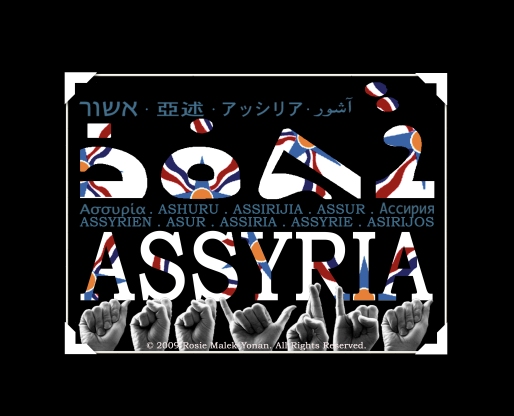




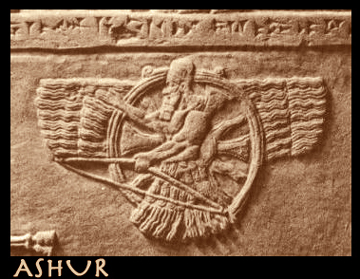 The first Assyrian religion was Ashurism derived from Ashur, the Assyrian supreme god. In the first century A.D. under King Abgar V of Edessa, Assyrians were the first to collectively as a nation convert to Christianity.
The first Assyrian religion was Ashurism derived from Ashur, the Assyrian supreme god. In the first century A.D. under King Abgar V of Edessa, Assyrians were the first to collectively as a nation convert to Christianity.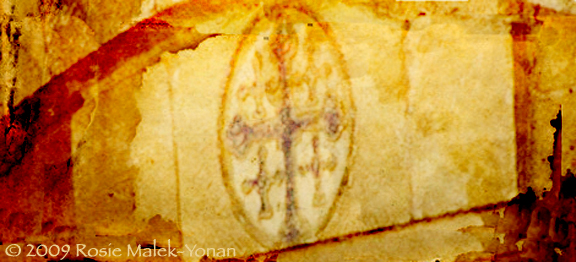
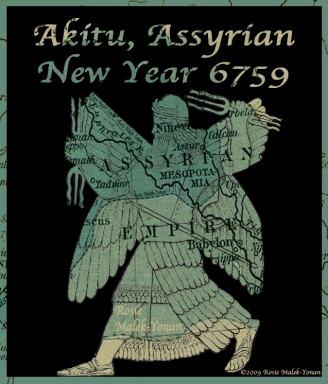
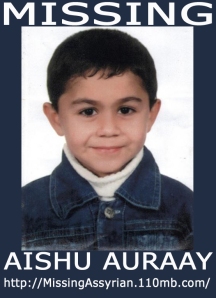 (
(

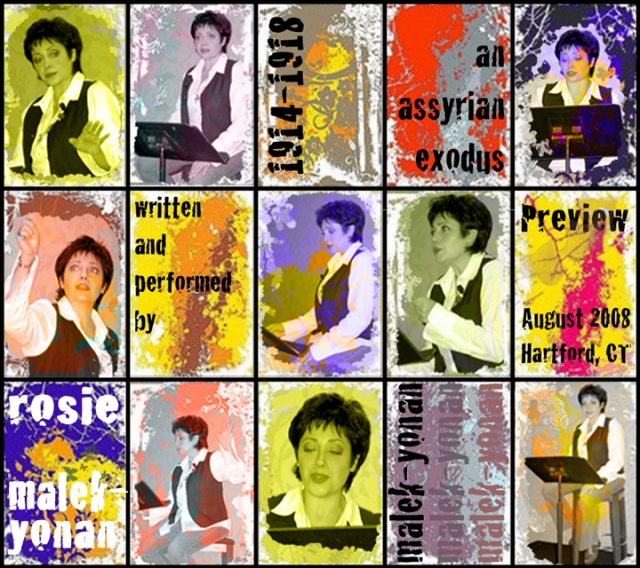



 We have been paying ransom to our captors since the beginning of the war. Our community has been dispersed but our spirit is still not broken. We will not be severed. Our 1.4 million population before the Iraq War has now been dwindled down to less than half a million. Assyrians still living in the interior of Iraq, are subjected to violent hate crimes and their human rights are disregarded. But we have not given up hope. We are still standing and have not sought revenge. We have not fought violence with violence.
We have been paying ransom to our captors since the beginning of the war. Our community has been dispersed but our spirit is still not broken. We will not be severed. Our 1.4 million population before the Iraq War has now been dwindled down to less than half a million. Assyrians still living in the interior of Iraq, are subjected to violent hate crimes and their human rights are disregarded. But we have not given up hope. We are still standing and have not sought revenge. We have not fought violence with violence. The new law allows a fixed quota of 25% for women, but other Iraqi minorities, such as Christians and Yazidis, have been omitted with the removal of Article 50. We are calling on Iraq’s Presidency Council and members of the Iraqi Parliament and lawmakers to immediately reinstate Article 50.
The new law allows a fixed quota of 25% for women, but other Iraqi minorities, such as Christians and Yazidis, have been omitted with the removal of Article 50. We are calling on Iraq’s Presidency Council and members of the Iraqi Parliament and lawmakers to immediately reinstate Article 50.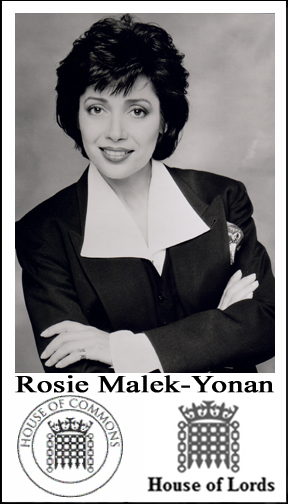
 Los Angeles (
Los Angeles ( Los Angeles (
Los Angeles (
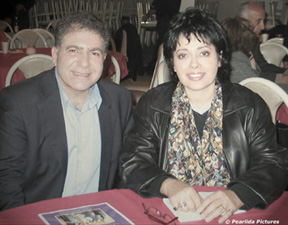 Los Angeles (
Los Angeles ( I want to look up at the Heavens and see the moon over Assyria. Often, I have wondered what it would be like to be able to say, I come from Assyria. To hold an Assyrian passport. To know that there will always be a home to return to free of persecution and fear. What would it be like for the language of the country to be the language I freely speak at home? Assyrian. What would it be like for all the sounds and sights to be predominantly Assyrian? What would it be like to see the Assyrian flag everywhere in its natural habitat? What if the local post office and all postage stamps were Assyrian? What if all schools, businesses, government offices, courts, judges, barbers, grocers, teachers, mechanics, president, vice president…were Assyrian? What if I could go to church without the fear that it can blow up at any time? What if my nation would never be persecuted for its Christian faith? What if I was no longer the foreigner in a foreign land, but a native in my own land? Would the street signs be in Assyrian? Would the marquees above businesses and theatres be in Assyrian? Would job applications be in Assyrian? Would the operator answering the phone speak my language? Would the tourists carry an Assyrian phrase book? Would all the Assyrian artifacts and national treasures return home to their rightful heirs?
I want to look up at the Heavens and see the moon over Assyria. Often, I have wondered what it would be like to be able to say, I come from Assyria. To hold an Assyrian passport. To know that there will always be a home to return to free of persecution and fear. What would it be like for the language of the country to be the language I freely speak at home? Assyrian. What would it be like for all the sounds and sights to be predominantly Assyrian? What would it be like to see the Assyrian flag everywhere in its natural habitat? What if the local post office and all postage stamps were Assyrian? What if all schools, businesses, government offices, courts, judges, barbers, grocers, teachers, mechanics, president, vice president…were Assyrian? What if I could go to church without the fear that it can blow up at any time? What if my nation would never be persecuted for its Christian faith? What if I was no longer the foreigner in a foreign land, but a native in my own land? Would the street signs be in Assyrian? Would the marquees above businesses and theatres be in Assyrian? Would job applications be in Assyrian? Would the operator answering the phone speak my language? Would the tourists carry an Assyrian phrase book? Would all the Assyrian artifacts and national treasures return home to their rightful heirs?